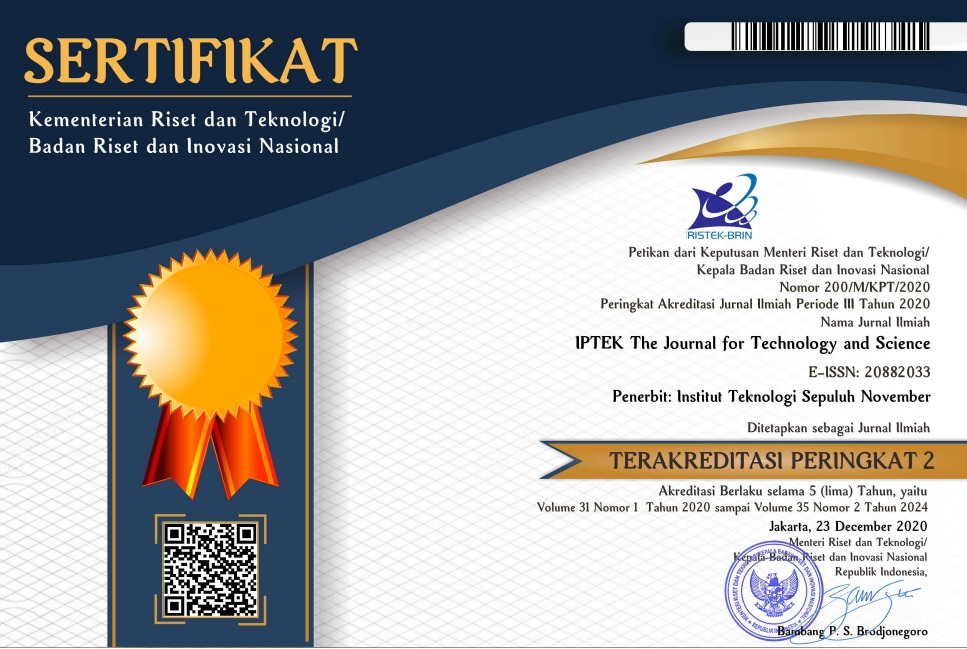Engine Torque Control of SI Engine using Linear Quadratic Integral Tracking (LQIT) Optimal Control
Abstract
Keywords
Full Text:
PDFReferences
A. Nugroho, “Desain Kompensator Sistem Pengaturan Kecepatan pada Spark Ignition Engine dengan Menggunakan QFT.” Bachelor Final Project, Dept. of Electrical Engineering, Faculty of Industrial Technology, ITS, Surabaya, Indonesia, 2004.
A. Salim. “Desain Kompensator sebagai Kontrol Robust pada Sistem Pengapian Spark Ignition Engine,” Master Thesis, Dept. of Electrical Engineering, Faculty of Industrial Technology, ITS, Surabaya, Indonesia, 2004.
Irianto. “Analisis Sistem Pengaturan Kecepatan Spark Ignition Engine Menggunakan Kontrol Robust MIMO,” Master Thesis, Dept. of Electrical Engineering, Faculty of Industrial Technology, ITS, Surabaya, Indonesia, 2005.
D. Khiar, J. Lauber, T. Floquet, G. Colin, T.M. Guerra, Y. Chamaillard, “Robust Takagi–Sugeno fuzzy control of a spark ignition engine,” Control Eng. Pract. Elsevier, vol.15, no.12,1446, 2007.
T. Nagata and M. Tomizuka, “Robust engine torque control by iterative learning control,” presented at American Control Conference, ACC '09, New Jersey, USA, p.2064, 2009.
N. Heintz, M. Mews, G. Stier, and A. Beaumont, “An Approach to Torque-Based Engine Management Systems,” SAE Technical Paper 2001-01-0269, doi:10.4271/2001-01-0269, 2001.
I. Kolmanovsky, M. Druzhinina, and J. Sun, “Nonlinear Torque and Air-to-Fuel Ratio Controller for Direct Injection Stratified Charge Gasoline Engines,” in Proceeding of AVEC, 5th Int'l Symposium on Advanced Vehicle Control, Michigan, p.1.
D. M. Lamberson, “Torque Management of Gasoline Engine,” Thesis Master, Mechanical Engineering, University of California at Berkeley, California, 2003.
A. Stefanopoulou, “Modeling and Control of Advanced Technology Engine,” Ph.D. Dissertation, Dept. of Electrical Engineering: Systems, University of Michigan, USA, 1996.
The MathWorks Inc.,“Using Simulink and Stateflow in Automotive Applications,” The MathWorks Inc., USA, 92, 1998.
M. Athans, “A Tutorial on the LQG/LTR Method,” in Proc. American Control Conference, ACC '86, vol.2, 1986, pp. 1289 -1296.
DOI: http://dx.doi.org/10.12962%2Fj20882033.v22i4.80
Refbacks
- There are currently no refbacks.
IPTEK Journal of Science and Technology by Lembaga Penelitian dan Pengabdian kepada Masyarakat, ITS is licensed under a Creative Commons Attribution-ShareAlike 4.0 International License.
Based on a work at https://iptek.its.ac.id/index.php/jts.


